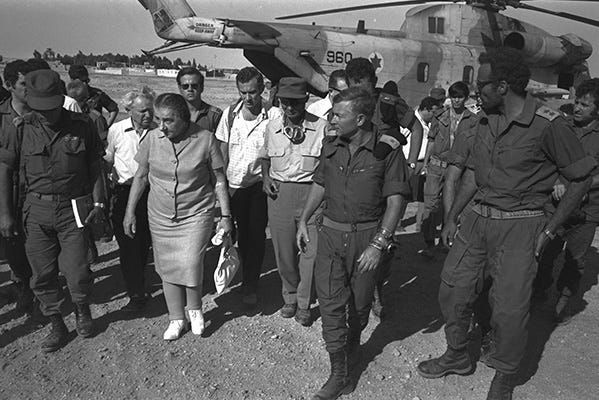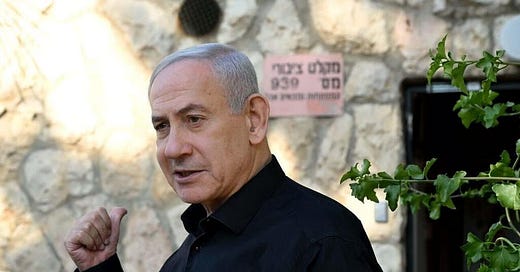Netanyahu's Golda Moment
During the Yom Kippur War in 1973, Golda Meir rejected early ceasefire calls to secure a decisive victory and restore Israel’s deterrence; Now, Netanyahu faces a similar choice in conflict with Iran.
“Peace between Israel and Iran is within reach,” the President of the United States recently declared — another signal that Washington’s backing for an Israeli strike is anything but indefinite.
Reports that the White House vetoed Jerusalem’s plan to eliminate Supreme Leader Ali Khamenei, coupled with swelling international demands for a ceasefire (some from dissidents inside the administration who dread a fresh U.S. entanglement), suggest that the green light we enjoyed on the eve of the campaign is flickering to yellow, perhaps even to red.
Yet Israel must press on. For Benjamin Netanyahu, this is his Golda Meir moment.
Fifty-two years ago, in the pivotal move that turned the Yom Kippur War, Ariel Sharon led paratroopers and tanks across the Suez Canal into “Africa,” poised to encircle Egypt’s beleaguered Third Army. At that point President Richard Nixon and Secretary of State Henry Kissinger intervened to stay Israel’s hand: they wanted Anwar Sadat to end the war feeling victorious enough to make peace and feared America might be dragged into a wider Middle East conflict—perhaps even a superpower showdown.
Opposite them stood Prime Minister Golda Meir. She understood that a nation shocked by a surprise attack had to emerge in triumph; only that could restore the deterrent shield vital to its survival.
For agonizing days, she withstood unrelenting U.S. pressure and escalating Soviet threats, standing immovable until Sharon’s forces completed their encirclement. In the end it was Cairo—not Jerusalem—that pleaded for a truce.
A fresh victory—this time over Iran—would not merely eliminate the nuclear menace; it would throw open the gate to a new era of Middle Eastern peace.
So, too, today. Though Israel was tragically caught off guard at the outset, as in 1973 it has recovered and achieved impressive gains. A decisive win against Iran would remove the existential threat and usher in the prospect of a regional realignment unimaginable only months ago.
That historic opportunity will evaporate if Netanyahu bows to foreign coercion. Like Golda, he must stand immovable.
Each day of combat carries us closer to the goal generations of Israelis have envisioned. As in 1973, this war will end at a negotiating table—and we must once again arrive there as victors.

This article originally appeared in Ynet on June 15, 2025.





Imagine what the world would look like if the Allies left Nazi Germany and Hitler in place simply to stop the violence. Some hard things are necessary to make way for a better future. Take care.
Finish the job, Israel. Do it on your terms. If that means taking out that s.o.b. in Tehran, so be it. This is one of those instances in life where it's better to apologize than ask permission. The feckless leaders of other counties will condemn you no matter what you do. Play it your way. Godspeed.